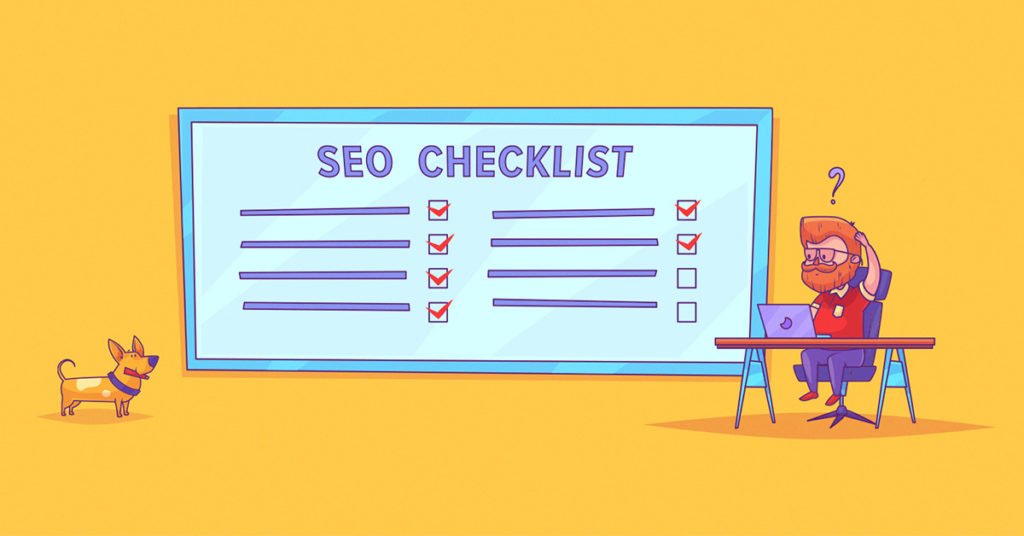No matter what industry you are in, everybody wants to be number 1 on Google. Not only does it give you the satisfaction of beating all your competitors, but it also brings you in lots of traffic. Although being rank 1 is a dream for many websites and business owners, it is possible with the right amount of work and strategy.
An SEO Checklist To Dominate Google

Now don’t think you can rank 1 for super competitive terms like Apple and iPhone, you’d just be wasting your time if you tried. However, selecting the right keywords and putting in the work is almost always bound to result in success. To help you on your journey to rank 1, we’ve put together a helpful SEO checklist that will give you all the do’s and don’ts you should be looking out for.
Here’s what you need to know to dominate the SERp.
How to Dominate the SERP
Google continually updates its algorithm every single week. Some changes are very minor and don’t affect rankings that much, but now and then a big update will come along and cause shockwaves. Some sites that used to rank first can disappear overnight. As worrying as it might sound, there is an easy way to avoid the wrath of Google and its updates: stick to being white hat.
Creating genuine backlinks and content is the perfect way to be loved by Google. Black hat SEO is often punished by Google and every time a new update comes out; it’s always trying to catch websites that manipulate their backlinks and content. By sticking to the good old white hat stuff you won’t have to worry about updates anymore, in fact, you should look forward to them knowing that black hat website will decrease in ranking!
With all of that in mind, here are the two most important factors which contribute to the ranking of your individual pages and overall website: on page and off page.
SEO Checklist: On Page SEO Items
On page SEO is everything to do with what you can control on your website itself. This includes things such as your title, meta description, content and pictures. When Google visits your website, it will be taking everything on the page into consideration to see how relevant the page is and what score you deserve. Having top notch on page SEO can significantly improve your SEO so making sure you get it right to start with is crucial.
Attention Grabbing Title Tags and Meta Descriptions
It might seem like Google doesn’t care about meta descriptions. The truth, however, is that both title tags and meta descriptions are extremely important.
It’s vital that your snippet is eye-catching, not just to your potential customers, but to Google too.
You can think of your snippet as a store window, since it’s the first glimpse of your website they get; By adding relevant keywords, and content that interests readers, you’re doing the equivalent of decorating your window with bright lights and dazzling displays.
If you can make your snippet of interest to both Google and your customers, then you’ve got a winning formula!
Ensure usability across all devices.
Plenty of people browse the internet during commutes or lunch breaks – and with such a large chunk of potential customers browsing on their phones, your site cannot be loaded with unreadable text and warped pictures.
Why does this make users less likely to click though?
Because it makes you appear less reliable. People might think that your competitors – the ones with the sites that aren’t broken – are more competent.
If that’s not enough to convince you to ensure that your websites work properly across multiple devices, then consider this simple fact;
People don’t like to put effort in when browsing the web. If your site is a challenge to read, then a large portion of potential customers are likely to click away before you’re able to get your message across.
Content
When it comes to on page SEO, content has always been king and will always be. It’s how Google determines what a website is about and ultimately what your audience will read when they land on it.
Making sure your content is unique and original as well as at least 400 words long is essential. Poorly written content or duplicate content from other parts of your website will result in lower rankings which you’ll want to avoid at all costs. We advising sticking to original and fresh content throughout your website to stop the chances of you receiving any penalties.
LSI Keywords
LSI keywords are keywords that are related to your primary keyword. A good place to find LSI keywords is by using tools such as LSI Graph. This will use Google itself to bring back a nice selection of relevant keywords which you should try to include on your page.
By doing this, Google will be able to understand your page better and therefore help improve your website’s rankings. We suggest including as many LSI keywords as possible in your content as it has proven to help pages improve their rank.
Outbound Links
External links on a web page can have a significant impact on the ranking of your website. Google is always trying to understand what a website is about and make the connection between different sites. Outbound links allow Google to see what websites you are linking to and how related they are to your website.
When using outbound links, we suggest picking high quality, relevant sites that provide the user with value and additional information. Link to the same site more than once per page is not ideal as Google can view it as spammy. We suggest having at least 3 outbound links per page that link to high quality and authoritative websites.
SEO Checklist: Off Page SEO Items
Off page SEO is as you may have guessed, every ranking factor that is not related to the content on the page. This part of SEO can often be confusing to some as it is usually a lot more technical and requires a lot more work compared to on page SEO. However, off page SEO is just as important if not more important than on page.
Loading Times
Google is always adding new ranking factors to help determine which websites deserve the number 1 spot. One of those new ranking factors is being dubbed “user experience” and is related to the overall experience a user gets from a website. If a website takes a long time to load, then it’s likely the user won’t be happy and will eventually give up and leave.
Knowing this, Google gives websites that load faster a ranking boost as users are more likely to stay on them instead of leaving. Other user experience factors include bounce rate and mobile optimisation. We suggest optimising your website so it loads as smoothly as possible without any delays.
SSL
Security is a big factor for Google, and they are always trying to promote good security on websites. Recently, Google gave a slight ranking factor to websites that had secure sockets layers encryption over those that don’t. Mainly found on e-commerce stores, these SSL certificates help stop various hacking attacks by encrypting the user’s data between the server.
If you don’t have an SSL certificate on your website, then we suggest getting one. Not only does it improve trust with your customers, but it will also give you a rankings boost. Visit your domain name registrar to get your own SSL certificate. In the unlikely event they don’t offer them or you don’t want to spend a ton of money, you can always use the free certificate over at Let’s Encrypt or CloudFlare.
Backlinks
Ever since Google was first created, backlinks have always played a significant role in rankings, and they still do to this day. Backlinks help Google understand what a web page is about and how trustworthy it is. By checking the number and quality of backlinks pointing to that page, Google can then decide if it’s genuine or just spam.
When it comes to getting backlinks for your website, we suggest sticking to high-quality natural backlinks from guest posts and collaborations with other websites. If you have great content in the first place then getting backlinks shouldn’t be much of an issue. Outreaching to fellow websites in your niche/industry is a great way to build a relationship and hopefully get a backlink to your website.
SEO Checklist: Things to Avoid
When it comes to SEO just as there is a list of things to do to improve your rank. There is also a rather long list of things not to do. Many website owners are always looking for ways to improve their rankings and often bad advice is passed around by other website owners and “SEO experts”. To make sure you don’t do more damage than good to your website, here are the top SEO mistakes you should be avoiding.
Spammy Backlinks
Spammy backlinks will often do a lot of damage to your website. If you think posting your website on blogs and forums is a good way to build trust and authority, then think again. Many spammy websites will crawl the internet looking for forums and blog to spam their links on.
Since most of these comments and posts are automatically accepted, spammers will often get their link on a website without the webmaster even knowing about it. If you try to do the same thing with your website, then you’ll only be flagging up warning signs with Google.
Google can easily differentiate a spammy website from a trusted one, and if your website happens to be on a spammy site then you could be penalized. If you want to build a strong backlink profile, then we suggest sticking to high-quality backlinks. Remember, 1 good backlink can make up for 20 or more low-quality spam links.
Repetitive Content
Using the same content over and over again is definitely a big no no. Using the same content over and over again is definitely a big no no!
It’s no secret that Google rewards websites for fresh content and using the same stuff over and over again on every webpage is a bad idea. It makes Google think that you are putting text on there just for the sake of text and that you’re not adding any value.
If you have a bit of text that you use time and time again on your website then we suggest changing it. Simply rewording or rephrasing a paragraph so it means the same thing can do wonders to your rank. As simple as it may sound, webmasters often avoid this due to pure laziness. Don’t be a lazy website owner, give your audience something new and exciting to read every time.
Unnatural Anchor Text Ratio
A final word of advice when it comes to SEO mistakes is keeping a careful eye on your anchor text. A long time ago Google used to put a lot of weight on the anchor text used to link one website to another. If you wanted to rank first for say “SEO checklist” then you simply made 20 backlinks with the anchor text “SEO checklist”. Google would read them and say hey this web page is to do with the keyword SEO checklist. As good as the idea was, people started to abuse this and over manipulated their anchor text for certain phrases.
Nowadays, paying attention to your anchor text ratio is vital if you don’t want to be penalized. We suggest using a mixture of phrase, LSI keywords and generic anchor text to give a nice diverse anchor text profile.
Supercharge Your Rankings
Now you’ve read our SEO checklist it’s time to get out there and climb the SERP! Now we understand how time-consuming SEO can be and if you want to see good results you certainly have to put the time in.






Leave a Comment
You must be logged in to post a comment.